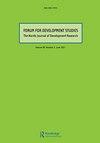Interpreting the Sustainable Development Goals through the Perspectives of Utopia and Governance
IF 1.1
Q3 DEVELOPMENT STUDIES
引用次数: 8
Abstract
Abstract The article analyses the Sustainable Development Goals (SDGs) from the perspective of their self-understanding of political sense expressed in key SDG documents, including both UN documents and reports produced by individual countries. Utopia and governance are presented as ideal-typical approaches and analytical tools for qualitative content analysis. This approach is argued to be particularly illuminating in the case of politics of international development, as international development is simultaneously highly utopian and deeply embedded in rationalities of governance. As this analytical framework is applied to the SDGs, it is shown that their utopian pronouncements are related to the idea of humanity as a single subject, as well as inclusive prosperity. On the other hand, the SDGs are curtailed by adherence to the ideas of contemporary governance, the international order and given ideas of development economics. The findings and the methodology are then further discussed in the broader context of international development.从乌托邦和治理的视角解读可持续发展目标
摘要本文从可持续发展目标(Sustainable Development Goals, SDG)关键文件(包括联合国文件和各国报告)中所表达的政治意义的自我理解角度来分析SDG。乌托邦和治理被呈现为理想的典型方法和定性内容分析的分析工具。这种方法被认为在国际发展政治的情况下特别具有启发性,因为国际发展同时是高度乌托邦的,并深深植根于治理的理性。当这一分析框架应用于可持续发展目标时,我们发现,它们的乌托邦宣言与人类作为单一主体的理念以及包容性繁荣有关。另一方面,可持续发展目标受制于当代治理理念、国际秩序和既定的发展经济学理念。然后在更广泛的国际发展背景下进一步讨论调查结果和方法。
本文章由计算机程序翻译,如有差异,请以英文原文为准。
求助全文
约1分钟内获得全文
求助全文
来源期刊

FORUM FOR DEVELOPMENT STUDIES
DEVELOPMENT STUDIES-
CiteScore
1.80
自引率
14.30%
发文量
24
期刊介绍:
Forum for Development Studies was established in 1974, and soon became the leading Norwegian journal for development research. While this position has been consolidated, Forum has gradually become an international journal, with its main constituency in the Nordic countries. The journal is owned by the Norwegian Institute of International Affairs (NUPI) and the Norwegian Association for Development Research. Forum aims to be a platform for development research broadly defined – including the social sciences, economics, history and law. All articles are double-blind peer-reviewed. In order to maintain the journal as a meeting place for different disciplines, we encourage authors to communicate across disciplinary boundaries. Contributions that limit the use of exclusive terminology and frame the questions explored in ways that are accessible to the whole range of the Journal''s readership will be given priority.
 求助内容:
求助内容: 应助结果提醒方式:
应助结果提醒方式:


